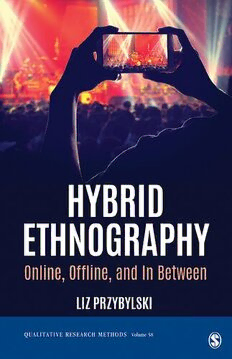Table Of ContentPraise for This Book
“An important text guiding the reader through the important and necessary
changes to be made for ethnographic research to keep pace with the growth
and pace of the digital world.”
—Kareema J. Gray, Johnson C. Smith University
“This text is definitely one all researchers and PhD candidate mentors have to
have in this day of digital communication.”
—Lois McFadyen C hristensen, UAB School of Education
“Hybrid Ethnography provides practical approaches to conducting both online
and face-to-face ethnographic research. Readers will find a detailed step-by-
step methodology, with clear ethical guidelines, that supports cutting-edge
interdisciplinary studies.”
—Monica Prendergast, University of Victoria
“The author has developed a book which is highly engaging whilst being
a very pragmatic and helpful guide for the novice researcher to undertake
hybrid ethnographic research. The author takes the novice researcher by
the hand and guides them with a flowing narrative through a very practical
approach so they can fully grasp the research process.”
—Elaine Haycock-Stuart, The University of Edinburgh
“Today’s cultures span physical & virtual spaces. This is an important book
that will teach tomorrow’s ethnographers how to navigate effectively across
these multiple and distributed spaces.”
—Nick V. Flor, University of New Mexico
“Hybrid Ethnography is an important and cutting-edge text and a must-read
for serious students of ethnography as well as researchers and scholars in fields
such as literacy, teacher education, educational leadership, English educa-
tion, and pop culture. This book is an excellent companion text to classics in
ethnography.”
—Margaret-Mary Sulentic Dowell, Louisiana State University
Qualitative Research Methods Series
Series Editor: David L. Morgan, Portland State University
The Qualitative Research Methods Series currently consists of 58 volumes that
address essential aspects of using qualitative methods across social and behavioral
sciences. These widely used books provide valuable resources for a broad range of
scholars, researchers, teachers, students, and community-based researchers.
The series publishes volumes that
• Address topics of current interest to the field of qualitative research
• Provide practical guidance and assistance with collecting and
analyzing qualitative data
• Highlight essential issues in qualitative research, including strategies
to address those issues
• Add new voices to the field of qualitative research
A key characteristic of the Qualitative Research Methods Series is an
emphasis on both a “why to” and a “how-to” perspective, so that readers will
understand the purposes and motivations behind a method, as well as the
practical and technical aspects of using that method. These relatively short
and inexpensive books rely on a cross-disciplinary approach, and they typi-
cally include examples from practice; tables, boxes, and figures; discussion
questions; application activities; and further reading sources.
New and forthcoming volumes in the series include the following:
Qualitative Instrument Design: A Guide for the Novice Researcher
Felice D. Billups
How to Write a Phenomenological Dissertation
Katarzyna Peoples
Reflexive Narrative: Self-Inquiry Toward Self-Realization and Its
Performance
Christopher Johns
Photovoice for Social Justice: Image Capturing in Action
For information on how to submit a proposal for the series, please contact
• David L. Morgan, Series Editor: [email protected]
• Leah Fargotstein, Acquisitions Editor, SAGE: leah.fargotstein
@sagepub.com
Hybrid Ethnography
To Gaspé
Hybrid Ethnography
Online, Offline, and In Between
Liz Przybylski
University of California, Riverside
FOR INFORMATION: Copyright © 2021 by SAGE Publications, Inc.
SAGE Publications, Inc.
All rights reserved. Except as permitted by
2455 Teller Road U.S. copyright law, no part of this work may be
Thousand Oaks, California 91320 reproduced or distributed in any form or by any
E-mail: [email protected] means, or stored in a database or retrieval system,
without permission in writing from the publisher.
SAGE Publications Ltd.
1 Oliver’s Yard All third party trademarks referenced or depicted
55 City Road herein are included solely for the purpose of
illustration and are the property of their respective
London, EC1Y 1SP
owners. Reference to these trademarks in no way
United Kingdom
indicates any relationship with, or endorsement by,
the trademark owner.
SAGE Publications India Pvt. Ltd.
B 1/I 1 Mohan Cooperative Industrial Area
Printed in the United States of America
Mathura Road, New Delhi 110 044
India ISBN: 978-1-5443-2032-8 (pbk)
SAGE Publications Asia-Pacific Pte. Ltd.
18 Cross Street #10-10/11/12
China Square Central
Singapore 048423
This book is printed on acid-free paper.
Acquisitions Editor: Leah Fargotstein
Editorial Assistant: Sam Diaz
Production Editor: Gagan Mahindra
Copy Editor: Karin Rathert
Typesetter: Hurix Digital
Proofreader: Barbara Coster
Indexer: Wendy Allex
Cover Designer: Dally Verghese
Marketing Manager: Shari Countryman 20 21 22 23 24 10 9 8 7 6 5 4 3 2 1
BRIEF CONTENTS
Preface xiii
Acknowledgments xix
Author Bio xxi
Chapter 1 • Introduction to Hybrid Ethnography 1
Chapter 2 • Ethics 17
Chapter 3 • Grounding: Research Reflexivity
and Connectivity 32
Chapter 4 • Collecting and Organizing Your Data 55
Chapter 5 • Participation, Observation, and Interpretation 78
Chapter 6 • Photography and Recordings in the
Hybrid Field 90
Chapter 7 • Interviews and Surveys 109
Chapter 8 • Hybrid Fieldwork Analysis 131
Chapter 9 • Sharing Research Results 148
Chapter 10 • Conclusion: Remaining Nimble in the
Changing Field 169
Bibliography 177
Index 187
DETAILED CONTENTS
Preface xiii
How to Use This Book xiii
The Hybrid Research Process xvi
Acknowledgments xix
Author Bio xxi
Chapter 1 • Introduction to Hybrid Ethnography 1
Overview 3
Hybrid Ethnography: Theoretical and Practical Shifts 6
The “What” and “Who” of Hybrid Research 6
The “When” and “Where” of Hybrid Research 8
Sharing Hybrid Research 11
What You Need to Begin 12
Select Your Area of Study 12
Identify Your Physical Fieldwork Site 13
Generate a Working Research Question 14
Summary 15
Further Reading 15
Chapter 2 • Ethics 17
IRBs, Ethics Boards, and Research Design 17
University-Based Review Boards 18
Additional Oversight Boards 19
Personal and Professional Ethics 19
Adapting to Changing Standards 21
Exercise 2.1 22
Balancing Multiple Ethics Standards 23
Concerns for Partially Online Fieldsites 24
Researcher Safety and Privacy 26
Positionality 28
Exercise 2.2 28

